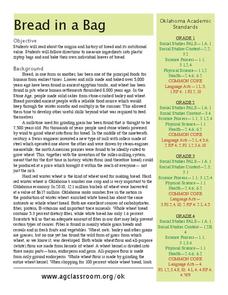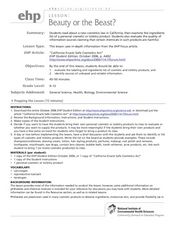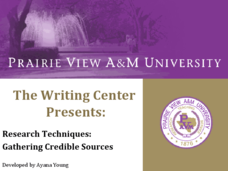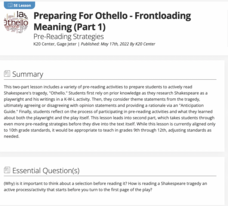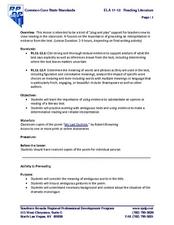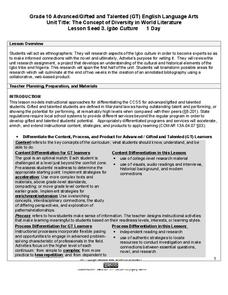Southern Poverty Law Center
Evaluating Reliable Sources
A lesson plan instills the importance of locating reliable sources. Scholars are challenged to locate digital sources, analyze their reliability, search for any bias, and identify frequently found problems that make a source unusable.
Alabama Department of Archives and History
How Two Alabamians Remembered Slavery Years Later
Designed to help readers recognize the point of view of the author of a primary source documents and analyze how that point of view influences the reliability of a text, young historians examine two personal letters, one written by...
Historical Thinking Matters
Rosa Parks: 1 Day Lesson
You've heard of the historical moment when Rosa Parks refused to give up her seat on a bus, but did you know that some historical accounts disagree on where she sat? Investigate this query with your young historians, and practice...
Mr. Roughton
The Travels of Marco Polo
Were the stories of Marco Polo's travels and interactions with the Mongols actually true? Using an excerpt from the book The Travels of Marco Polo, your young historians will answer guiding questions to discuss the accuracy and...
Curated OER
Understanding Rhetoric and Evaluating Bias in Text
Students can learn about bias in text and the rhetorical principles proposed by Aristotle.
Curated OER
Bread in a Bag
Could the history of bread really be interesting? Yes, it could! An informational text gives scholars wheat production background from 8,000 years ago, discussing different types of bread and the current industry in Oklahoma. Learners...
Curated OER
Beauty or the Beast
Does the FDA really intend to protect public health? Spark a debate in your chemistry or health class by using this article, titled "Beauty or the Beast." It questions the safety of cosmetics and toiletry products, govenment regulations,...
Center for the Advancement of Ethics and Character
The Lion, the Witch, and the Wardrobe
C.S. Lewis' The Lion, the Witch and the Wardrobe is the anchor text for a three week unit that focuses on responsibilities, ethics, and virtues. While specific lesson plans are not included in this overview, a focus and discussion...
Curated OER
Research Techniques: Gathering Credible Sources
How can you spot a credible source? What even makes a resource reliable in the first place? Answer some of these questions with this presentation. Although intended for higher education, this PowerPoint could be modified for middle...
K20 LEARN
Preparing for Othello - Frontloading Meaning (Part 1): Pre-reading Strategies
The success of any lesson based on a complex text relies heavily on what instructors do before beginning the reading. Before reading Othello, scholars engage in a series of pre-reading activities, including completing an anticipation...
Curated OER
A Novel Study Unit for The Cay
Novelly written questions are perfect for a novel study guide unit on The Cay. The well-rounded resource contains an anticipation guide for scholars to complete before reading, a variety of questions per chapter of the book, and a post...
Southern Nevada Regional Professional Development Program
Reading Literature - My Last Dutchess
Draw back the curtain, add a spot of joy to your class, and let learners be lessoned by a close reading exercise that models how to develop an interpretation based on evidence drawn from a text. Robert Browning’s dramatic monologue “My...
Curated OER
Fast Food and Daily Nutrition Choices
Students explore food. In this nutrition instructional activity, students investigate multiple facets of healthy eating and how the fast food industry impacts our society. They will participate in class discussions, read from their...
Curated OER
Discussion Guide for The Catcher in the Rye
Is Holden Caulfield a trustworthy narrator? Groups work together to find evidence in The Catcher in the Rye to support a yes or no stance.
EngageNY
Contrasting Evidence: “Games Can Make a Better World” and “Video Games Benefit Children, Study Finds”
Anecdotes, analogies, testimonies, statistics. The most powerful arguments rely on multiple types of evidence. Scholars explore the topic as they read contrasting evidence about the benefits of video games. They complete Venn diagrams to...
K20 LEARN
Street Cred: Evaluating Sources
A instructional activity on evaluating sources of information teaches scholars to "think twice" before using a source. Researchers examine a resource's home page, author, and sponsor, as well as the date published and the documentation...
TPS Journal
Sourcing a Document: The First Thanksgiving
How reliable is a painting of the first Thanksgiving if it was created 300 years after the fact? Learners assess the validity of a primary source image to determine what it can actually reveal about this event.
Curated OER
Peer Review Form for Scientific Writing
A peer review form just for science? Specifically tailored for science writing, this resource asks editors to give detailed responses to questions about the relevance of the study, the clarity of the hypotheses, the methods, materials,...
National Endowment for the Humanities
Revolution '67, Lesson 2: What Happened in July 1967? How Do We Know?
Even in a world in which dozens of participants and curious onlookers record every controversial event, the basic facts of what happened are often in dispute. Revolution '67, Lesson 2 explores 1967 Newark, New Jersey using an examination...
Maryland Department of Education
The Concept of Diversity in World Literature Lesson 3: Igbo Culture
What cultural concepts must readers understand in order to connect to Things Fall Apart? As part of their study of Chinua Achebe’s novel, class members research Nigeria and the Igbo culture to create a collaborative, web-based, annotated...
Odell Education
Building Evidence-Based Arguments: “Doping can be that last 2 percent.”
Even the most thrilling sports career can end in an asterisk if the player uses performance-enhancing drugs. Focused on the topic of doping in sports, a seventh grade unit breaks down the arguments for and against steroids in five...
Scholastic
Consider the Source
Who is more trustworthy when it comes to marijuana: a high school student, or The National Institute on Drug Abuse? Sources matter when reading informational text. Help teenagers discern which facts are true with an activity that focuses...
Curated OER
Statistical Accuracy and Reliability
Ninth graders assess the accuracy and reliability of current survey data and how it is represented. They design a survey, collect data, and use technology to analyze the data and present the results. Students examine scatter plots and...
Curated OER
Communities in Crisis Lesson 1: Primary Source? What is That?
Distinguish between primary and secondary source documents using the theme of philanthropy. Middle schoolers discuss Anne Frank: The Diary of Young Girl as a way to study the past using a primary source. Then they investigate how to...







